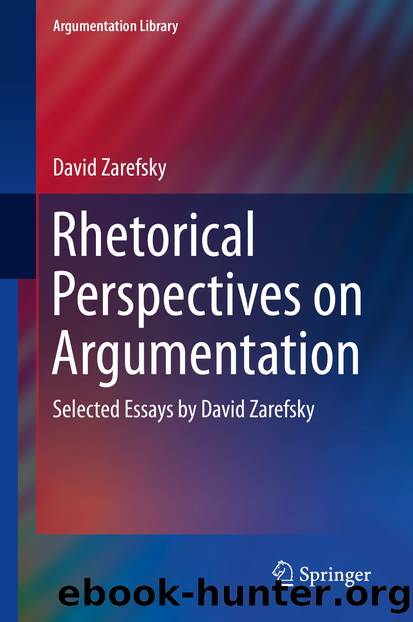Rhetorical Perspectives on Argumentation by David Zarefsky

Author:David Zarefsky
Language: eng
Format: epub
Publisher: Springer International Publishing, Cham
11.3 The Ideal and the Real
It is important to distinguish between models of ideal argumentation (normative) and studies of actual argumentation (descriptive), lest one mistakenly compare one perspective on argument as an ideal with another as actually practiced. It is unproductive, for example, to say that the model of critical discussion can accommodate rhetorical elements easier than actual rhetorical argument can incorporate pragma-dialectics. Normative models of dialectic may not resemble actual cases of dialectic, for that matter, just as normative models of rhetoric may not resemble actual rhetorical practices. We can hardly expect, therefore, to make a fair comparison between the ideal in one case and the reality in the other.
van Eemeren and his colleagues regard the critical discussion as a normative model of interpersonal argumentative exchange. Interlocutors discover that they are in disagreement and then, desiring consensus, commit themselves to resolve the disagreement by following certain procedures and observing certain rules. The rules are not just their own invention; empirical research suggests that these are rules that ordinary arguers claim to share. But van Eemeren and colleagues are not contending that every argumentative encounter actually follows all these rules. They are observed in actual cases to greater or lesser degree. They are norms toward which to strive. The task of the argument analyst is to assess to what degree the actual argument observed the norms, and thereby to encourage arguers to try harder—so that the norms, if never fully realized, can be more closely approximated.
There are two ways in which we might imagine a rhetorical situation. One involves a single advocate addressing an audience; the other, two or more advocates in competition for the adherence of an audience. The first of these frames of reference is identified with public speaking; the second, with debate. The first might resemble a dialectic in which the audience collectively assumes the role of one interlocutor, except that the audience is relatively passive and must be anticipated and responded to by the speaker without the benefit of extended interaction. The second frame of reference might resemble a dialectic between two interlocutors, except that they are not trying to resolve a disagreement to their own mutual satisfaction; they are appealing to the audience to agree with their position rather than their opponent’s. Even in an ideal sense, these two frames of reference are often combined, as in the case of an audience attending to a single speaker in the midst of an ongoing controversy in which several advocates appeal for their support with regard to the issue at hand.
Tending to focus on the study of specific cases, scholars of rhetoric have not focused so much on the development of an ideal model analogous to that of the critical discussion. Despite its lack of specificity, though, one good candidate for such a model is Perelman and Olbrechts-Tyteca’s notion of the universal audience (Perelman and Olbrechts-Tyteca 1969). In their brief discussion, this is an audience of all reasonable people—an audience that is a mental construction of the speaker rather than one that actually exists.
Download
This site does not store any files on its server. We only index and link to content provided by other sites. Please contact the content providers to delete copyright contents if any and email us, we'll remove relevant links or contents immediately.
Getting to Maybe by Richard Michael Fischl(962)
Legal Forms for Starting & Running a Small Business by Fred S. Steingold(554)
Burtons Legal Thesaurus by William C. Burton(550)
The Joy by Paul Howard(456)
Rhetorical Perspectives on Argumentation by David Zarefsky(365)
Multimethod Research, Causal Mechanisms, and Case Studies by Goertz Gary(304)
Learning Legal Skills and Reasoning by Sharon Hanson(274)
101 Things I Learned® in Law School by Vibeke Norgaard Martin & Matthew Frederick(257)
Oliver Wendell Holmes Jr., Pragmatism and Neuroscience by Jay Schulkin(231)
The Fallacy of Corporate Moral Agency by David Rönnegard(223)
Argument Types and Fallacies in Legal Argumentation by Thomas Bustamante & Christian Dahlman(189)
Ethics and Policies for Cyber Operations by Mariarosaria Taddeo & Ludovica Glorioso(146)
